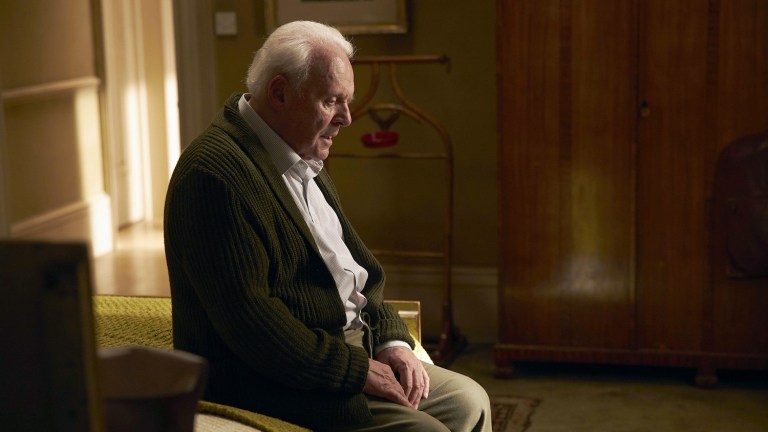Oscars 2021: Anthony Hopkins Win Shows Danger of Relying on Predictions
Anthony Hopkins’ win over Chadwick Boseman at the Academy Awards created an awkward and disappointing end note to the strangest Oscars in memory.

It was supposed to end like a movie. That was certainly one of the buzzwords used by producers of 2021’s Oscars telecast in the run-up to tonight’s Academy Awards. Other terms included “cinematic” and “joyful.” The broadcast began like an Ocean’s 11 movie, with producer Steven Soderbergh’s camera following Regina King to the Oscar stage. Yet if this was a movie, it’s probable even Soderbergh didn’t expect the twist ending when Anthony Hopkins beat Chadwick Boseman for Best Actor.
Yet that is how the final award of the night played out. Because despite nearly every Academy Awards since 1948 ending their evenings on Best Picture, Oscars 2021 closed the show on the Best Actor category—and an award that most expected Boseman to win for Ma Rainey’s Black Bottom, which would’ve made him only the third actor to win a posthumous Oscar (the other two being Peter Finch for Network and Heath Ledger for The Dark Knight).
Yet when Joaquin Phoenix opened the envelope to announce the winner, to the shock of many awards watchers at home, and probably more than a few people in the room at a Californian train station, Hopkins’ name was read out instead of Boseman’s.
The peculiarity of the moment was only further highlighted by the fact that Hopkins was not there to pick up the second Oscar of his career for The Father. Instead Phoenix politely announced, “The Academy congratulates Anthony Hopkins and accepts the Oscar on his behalf.” And like that the 93rd Annual Academy Awards were over.
To be clear, Hopkins was not underserving of the Oscar. One of the greatest thespians of his generation, Hopkins drills into all of his characters to a granular level, and in Florian Zeller’s The Father, he gave a genuinely haunting rendition of a man enduring the waking nightmare of dementia; his essay of how one loses their grasp on reality and the world around them is devastating.
However, it is hard not to suspect that by breaking with seven decades of tradition, the Oscar producers were counting on Boseman to win the Best Actor award—as he had at all other major awards ceremonies this year, minus Hopkins’ BAFTA win, with the British Academy Film Awards often favoring British talent. Boseman winning a posthumous Oscar also would’ve provided an excellent, if bittersweet, ending to what was being presented as an intimate Hollywood story. The industry bids farewell to a tremendous talent who was taken far, far too soon.
One imagines, like so many Oscar prognosticators (including myself), producers looked at the numbers, and assumed the Academy would do like the Golden Globes, Critics Choice Awards, and Screen Actors Guild before them and recognize Boseman’s beautiful, monumental talent with the one and only performance he could ever win for.
So the Oscars telecast ended not on Nomadland’s raucous (and joyful) Best Picture win, but with Boseman’s final farewell being denied, and a living winner who was not even able to attend the ceremony, likely due to traveling at an advanced age during a pandemic.
It gave the Oscars ceremony a sour aftertaste and a sense of disappointment. The irony is it did not need to close out this way. While there is probably much to say about why Boseman’s heartbreaking performance as a Black musician in the 1920s being used and abused by white business owners lost to an old favorite, Hopkins is just as raw in a turn many consider to be the best of his career—and one that is situated nearly 30 years since his last Oscar win for The Silence of the Lambs.
But how this category played out will fairly frustrate many, and it acting as the night’s denouement reframes an evening that saw a tremendously diverse field of Oscar winners throughout the categories, including Daniel Kaluuya in Best Supporting Actor for Judas and the Black Messiah, Youn Yuh-jung in Best Supporting Actress for Minari, and Chloé Zhao in Best Director for Nomadland. Even Nomadland’s wins for Best Picture and Best Director are recognitions of a movie with perhaps the strongest anti-capitalist sentiments since The Grapes of Wrath (which won Director, not Picture, in 1941).
But instead of Frances McDormand’s triumphant wolf howl in honor of American Nomad culture, we’re left with this empty feeling by a ceremony that was supposed to be cinematic.
If tonight was a movie, it proved to be an anti-climactic one.
